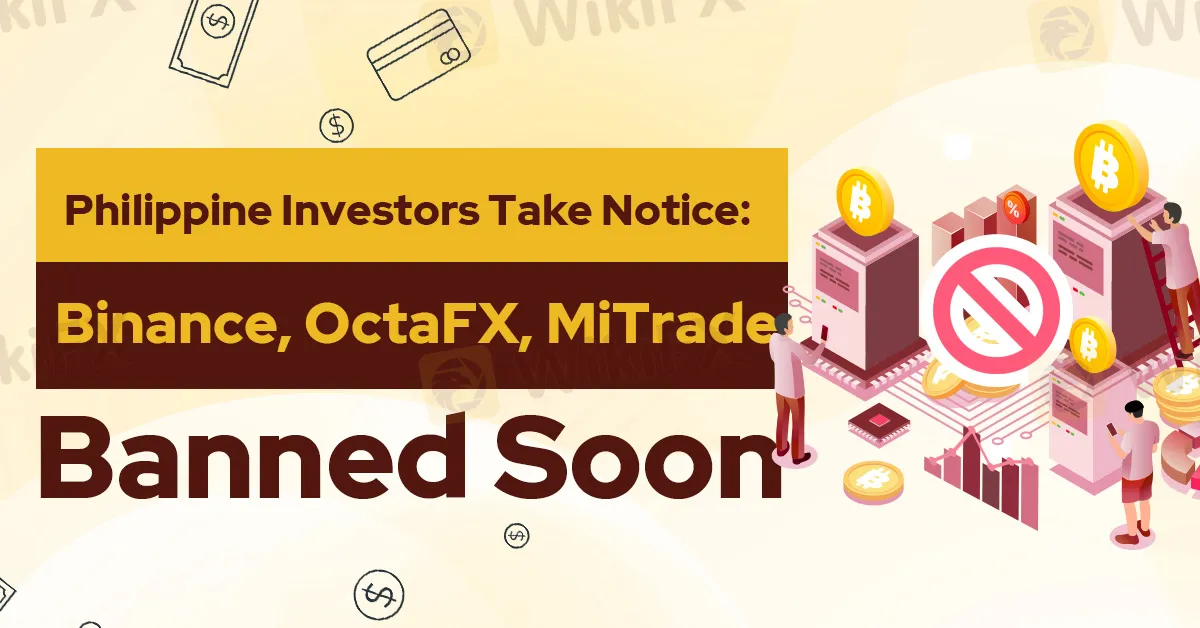简体中文
繁體中文
English
Pусский
日本語
ภาษาไทย
Tiếng Việt
Bahasa Indonesia
Español
हिन्दी
Filippiiniläinen
Français
Deutsch
Português
Türkçe
한국어
العربية
Philippine Investors Take Notice: Binance, OctaFX, MiTrade Banned Soon
Abstract:The Philippines Securities and Exchange Commission, led by Kelvin Lee, has offered clarity on the forthcoming ban affecting Binance, MiTrade, and OctaFX, outlining the timeline and regulatory implications.

The head of the Philippines Securities and Exchange Commission (SEC), Kelvin Lee, has clarified the impending ban on Binance, stating it will come into effect three months after the advisory's issuance.
Scheduled to be enforced within three months of the SEC's advisory release on November 28, the block on Binance in the Philippines allows users time to withdraw their investments from the platform.
Lee provided this clarification during a panel on December 13, aiming to address confusion sparked by the announced ban following Binance's unlicensed operations. The SEC decision stems from regulatory concerns due to Binance's lack of proper registration and authorization within the country.
Highlighting Binance's unauthorized offering of securities in the Philippines under the Securities Regulation Code (SRC) or Republic Act No. 8799, the commission emphasizes its lack of legal authority to conduct such activities.
According to local reports from BitPinas, Lee explained the ban's timeline, initially proposed for as short as one month or even a week. However, to accommodate the Christmas holiday period and minimize inconvenience for Filipino investors, Lee extended the timeframe to three months from the advisory date.
The SEC's actions extend beyond Binance to encompass other unregistered exchanges like OctaFX and MiTrade, facing similar bans within a three-month deadline. The commission is actively monitoring several unregistered exchanges and adopting a “wait-and-see” approach to their compliance post the Binance crackdown.

Addressing criticisms about Binance's cost-effectiveness compared to registered exchanges, Lee points out that Binance's lower costs stem from its non-compliance with local regulations, contrasting them with compliant entities that incur necessary compliance costs.
Lee emphasizes the importance of investing in registered entities for consumer protection, noting the existence of 17 registered virtual asset service providers in the Philippines offering fiat-to-crypto services.
The SEC highlights Binance's active promotion of crypto trading in the Philippines, including via social media, considered an offense under Philippine law.
Furthermore, the SEC's advisory warns that individuals involved as promoters, recruiters, influencers, endorsers, or enablers for Binance in the Philippines, even through online channels, could face criminal liability. Penalties for these offenses could range up to 5 million Philippine Pesos (approximately $90,000) in fines or imprisonment for up to 21 years.
Under Philippine law, entities engaged in buying or selling securities, operating as a broker-dealer, or establishing and managing securities exchanges are mandated to obtain an additional license from the SEC.

Disclaimer:
The views in this article only represent the author's personal views, and do not constitute investment advice on this platform. This platform does not guarantee the accuracy, completeness and timeliness of the information in the article, and will not be liable for any loss caused by the use of or reliance on the information in the article.
Read more

Bybit Shuts Down NFT Marketplace Amid Crypto Market Downturn
Bybit announces the closure of its NFT marketplace, citing efforts to streamline offerings. Discover the latest trends in the declining NFT market and its shift to utility-based growth.

March Oil Production Declines: How Is the Market Reacting?
Oil production cuts in March are reshaping the market. Traders are closely watching OPEC+ decisions and supply disruptions, which could impact prices and future production strategies.

How to Calculate Leverage and Margin in the Forex Market
Leverage amplifies both potential profits and risks. Understanding how to calculate leverage and margin helps traders manage risks and avoid forced liquidation.

Galaxy Digital Settles $200M in Luna Token Manipulation Case
Galaxy Digital pays $200M to settle Luna token manipulation probe by NY regulators, linked to TerraUSD’s 2022 crash, impacting crypto market stability.
WikiFX Broker
Latest News
Exposing the Top 5 Scam Brokers of March 2025: A Closer Look by WikiFX
Gold Prices Climb Again – Have Investors Seized the Opportunity?
Webull Launches SMSF Investment Platform with Zero Fees
Australian Regulator Warns of Money Laundering and Fraud Risks in Crypto ATMs
The Withdrawal Trap: How Scam Brokers Lure Victims into Paying More
FCA to Investors: Think Twice Before Trusting These Brokers
Trump\s tariffs: How could they affect the UK and your money
Trump gambles it all on global tariffs he\s wanted for decades
HTFX Spreads Joy During Eid Charity Event in Jakarta
How Will the Market React at a Crucial Turning Point?
Currency Calculator







